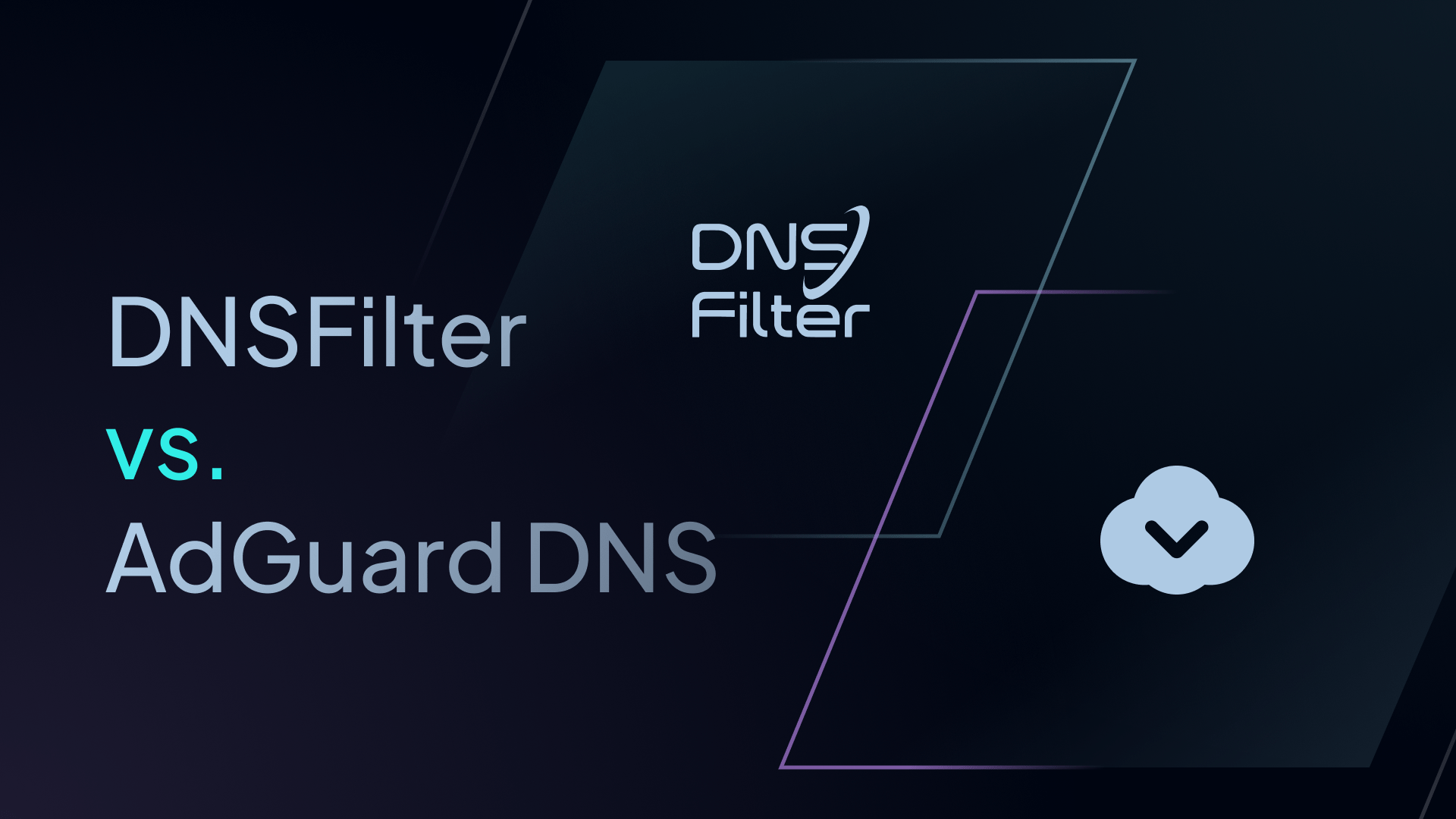The main difference between DNSFilter and AdGuard DNS is that DNSFilter focuses on enterprise-grade threat protection and content filtering with AI detection, while AdGuard DNS emphasizes ad blocking and privacy protection for individual users.
DNSFilter and AdGuard DNS both offer DNS filtering to block threats, unwanted content, and trackers. But they were built for very different types of users. In this article, we’ll compare DNSFilter vs AdGuard DNS in terms of features, pricing, analytics, and support.
And if you’re looking for something that combines the best of both into a powerful, flexible, and cost-effective solution, stay tuned to the end, where we explain why a third option might be better suited to your needs.
What are DNSFilter and AdGuard DNS?
DNSFilter is a cloud-based DNS security platform built for businesses, MSPs, and educational institutions. It uses AI to detect and block malicious domains, phishing sites, and inappropriate content. It also offers fast DNS resolution and integrations with other tools like SIEM and RMM platforms.
AdGuard DNS is a DNS solution that blocks ads, trackers, and malicious websites. It’s built with privacy in mind, and while an enterprise plan is available, it’s utilized mainly for personal or lightweight team use.
Let’s see how the two compare.
DNSFilter: Pros and Cons
Best for: Businesses or MSPs that need fast, scalable DNS filtering with real-time threat detection.
Key Features
- AI-powered filtering for malware, phishing, and unwanted contentFast DNS resolution via global Anycast network
- Multiple plans for different use cases (business, MSP, education)
- RMM, SSO, and SIEM integrations (some cost extra)
Pros
- Real-time threat detection
- Easy to deploy and manage
- Strong performance
Cons
- Extra cost for data exports and SIEM integration
- Lack of advanced features compared to alternatives
- No full support for all modern DNS protocols
- UI could be more intuitive
Our Take on DNSFilter
DNSFilter is a good choice for companies that want smart DNS filtering and fast setup. However, its limitations around analytics and added costs for key features may turn off some users.
AdGuard DNS: Pros and Cons
Best for: Individuals and families who want DNS filtering to block ads and trackers.
Key Features
- Free public DNS with ad/tracker blocking
- DNS-over-HTTPS and DNS-over-TLS support
- Simple web dashboard for customization
- Cost-effective pricing structure
Pros
- Free plan available
- Easy setup on any device or network
- Strong focus on privacy
- Affordable paid plans
Cons
- Features are limited to personal and small-scale use
- No business-level analytics or integrations
- No SIEM or enterprise deployment tools
- Weak reporting capabilities
- Limits on monthly queries and device counts
Our Take on AdGuard DNS
AdGuard DNS is a popular choice for personal use. It’s lightweight and blocks most ads and trackers, but it lacks the features businesses need for large deployments or detailed control.
DNSFilter vs. AdGuard DNS
Plans & Pricing
Both DNSFilter and AdGuard DNS offer tiered pricing models, catering to different user types and organizational needs. Here's how they stack up.
DNSFilter keeps things simple with three main plans:
- Basic – $1.15/user/month
- Pro – $2.30/user/month
- Enterprise – $3.00/user/month
They also offer custom pricing for specific user groups:
- MSPs – Minimum $150/month; additional users billed based on selected plan
- Education – $4/student/year (125 student minimum)
- Public Wi-Fi – $5/access point/month
AdGuard DNS includes a free plan (with limited features), plus three paid options:
- Personal – $2.49/month (10M requests, 5 servers, 20 devices, 1,000 rules)
- Team – From $14.99 to $149.90/month (up to 100M requests, 50 servers, 200 devices, 5,000 rules, 2 dedicated IPv4s)
- Enterprise – Custom pricing with unlimited usage (contact sales)
AdGuard DNS is much more affordable compared to DNSFilter, taking the win in this category.
Features, Clients, and Integrations
Both DNSFilter and AdGuard DNS offer the following core capabilities.
However, there are also some key differences between the two.
While AdGuard provides the basic features necessary for personal use, DNSFilter clearly provides more depth for businesses.
Analytics
DNSFilter and AdGuard have their strengths and weaknesses when it comes to analytics.
AdGuard offers a longer retention period for DNS query logs but lacks SIEM log integration, which can be a deal-breaker. On the flip side, while DNSFilter offers SIEM log streaming and the ability to export data, it charges extra for this functionality.
As such, the winner of this category will depend on your business needs.
Support
Both platforms offer documentation and email support, but DNSFilter also provides community and chat support – although the chat support is a basic chatbot that directs you to a help article. In any case, they are additional support channels that AdGuard doesn’t offer. Therefore, DNSFilter wins this category.
DNSFilter vs. AdGuard DNS vs. Control D
If neither DNSFilter nor AdGuard fully meets your needs, consider Control D, an advanced DNS security solution that offers more flexibility, support, and enterprise-level features at an affordable price point.
Easy Onboarding & Transparent Pricing
Control D is built for speed and ease of use, not just in DNS resolution but in how quickly you can get up and running, too. You can sign up for a no-obligation 30-day free trial (no credit card required) and get started immediately.
Everything is priced per Endpoint, with no upsells or gated features:
- Enterprises – $2/Endpoint/month
- MSPs – $1/Endpoint/month
- Schools & Non-Profits – Special pricing available
Deploying Control D across your entire device fleet is just as straightforward. Use a provisioning code and push Control D to your entire network in minutes via your preferred RMM tool.
Best-in-Class Malware Protection
Control D approaches malware filtering like a security product should – fast, proactive, and constantly evolving. As shown by independent testing, Control D has the most effective malware filter in the industry, with a block rate of 99.97%.
Instead of relying on outdated static lists, Control D uses live threat feeds and machine learning to evaluate domains in real time. If a domain looks suspicious or behaves like known malware infrastructure, it gets blocked instantly, eliminating threats before a device even makes a connection.
Ad & Tracker Blocking
Unlike traditional ad and tracker blockers, Control D blocks them before they load by stopping them at the source, ensuring they never resolve on your device. This means websites load faster, and your internet isn’t slowed down by junk.
The added benefit is that Control D lets you choose how much to block with three modes – Relaxed, Balanced, and Strict – allowing you to customize your filtering to suit your needs.
Blockable Services
Control D takes granular filtering to a new level with a massive library of blockable Services – over 1,000 and growing. These Services aren’t just content categories. They’re actual apps, platforms, and web tools like Instagram, Slack, ChatGPT, and hundreds more, each grouped and labeled so you can take action without needing to know the exact domain structure behind them.
Whether you want to block productivity-killers or simply fine-tune what’s available to different teams, Control D gives you that power. For comparison, DNSFilter and AdGuard offer less than 100 blockable Services.
Traffic Redirection
Control D’s Traffic Redirection lets you choose exactly where your DNS traffic goes – down to the individual Service or domain. With over 100 proxy locations across more than 60 countries, you’re not locked into a single geographic region. You can set a default location for all traffic, toggle redirects for specific Services to specific countries, or a combination of both.
This kind of flexibility means you can keep general web traffic local and ensure sensitive tools always resolve in compliant regions without needing a VPN. DNSFilter and AdGuard DNS do not offer this functionality.
Geo-Custom Rules
Control D’s Geo-Custom Rules give you the ability to leverage geographic data to your DNS policies. Instead of relying on broad, static geo-blocking, you can craft precise rules based on where a query is coming from, where it’s headed, or which networks are involved.
Examples include:
- Block queries resolving to IPs in a specific country or ASN
- Redirect queries that don't resolve to IPs in a specific country or ASN
- Bypass queries made from IPs in a specific country or ASN
- Block queries made from IPs not in a specific country or ASN
- Or any combination of the above
This makes it easy to segment traffic for regulatory reasons and reduce risk from specific regions, such as Russia or Iran. DNSFilter and AdGuard lack this feature.
In-Depth Analytics & Monitoring
Every request – whether it’s allowed, blocked, or redirected – is logged and shown in real time, so you can instantly see what’s going on in your network. You can also look at historical data to investigate specific events or track long-term trends.
If you want centralized visibility with your existing security infrastructure, streaming query logs directly to your SIEM tool is possible at no extra fee. You can also automate reports to land in your inbox daily, weekly, or monthly to stay informed without manual effort.
Advanced Chatbot
Barry isn’t your average chatbot; he’s a highly trained, AI-powered assistant that’s available 24/7 to help with anything from quick setup questions to complex policy configurations. He understands Control D inside and out, thanks to a constantly evolving knowledge base that includes technical documentation, internal expertise, and user feedback.
He’s accurate, responsive, and always learning, so the more users interact with him, the sharper and more helpful he becomes.
Full Cross-Platform Support
Control D is designed for real-world environments where devices and systems vary. It supports a wide range of operating systems – including Windows, macOS, Linux, iOS, and Android – as well as routers and browsers. This allows you to enforce DNS-level control and filtering across your entire network, no matter what hardware or OS is in use.
For IT teams managing large or diverse deployments, Control D also integrates with enterprise tools like Active Directory, SIEMs, RMM platforms, and Single Sign-On providers such as Okta. That makes it easy to automate onboarding, apply group policies, and maintain visibility across every endpoint in your network.
👉 Check out our full list of trusted partners and integrations.
Dual Stack Ready & Modern Protocol Support
Control D is dual-stack ready, natively supporting both IPv4 and IPv6 environments. It also supports legacy DNS, as well as every major encrypted DNS protocol, including DNS-over-HTTPS (DoH), DNS-over-TLS (DoT), DoH3, and DNS-over-QUIC (DoQ).
Full API Access
Control D is also accessible through a fully documented API, giving you the freedom to control your DNS environment programmatically.
Whether you're managing thousands of endpoints, rotating authorized IPs, or deploying user profiles, Control D’s API makes it possible to do so without touching the dashboard itself.
Custom Data Storage Region
With Control D, you’re not locked into a one-size-fits-all approach when it comes to data storage. You can choose where your DNS logs and account data are stored by selecting from three default regions: North America, Europe, or Australia.
If you need something more specific, Control D can set up a custom storage location tailored to your organization’s compliance or security needs.
Performance
Note: AdGuard is not included in this list. Therefore, we’ll be comparing Control D against DNSFilter.
DNSFillter takes the lead in query speed with a score of 14.84 ms, but is followed closely behind by Control D with a speed of 16.09 ms.
Control D outperforms DNSFilter in uptime performance results, with a score of 99.91%.
Again, Control D scores far better in server quality with a score of 99.91%.









